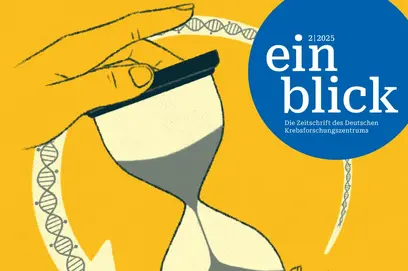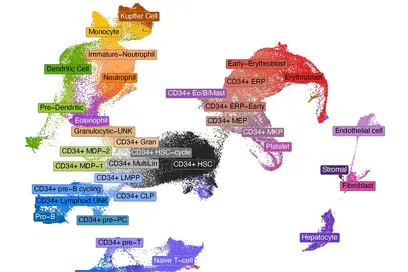Nach Verletzungen mit Blutverlust muss der Körper das lebensnotwendige Blutvolumen schnell wiederherstellen. Dafür sorgt eine bestimmte Gruppe von Stammzellen im Knochenmark. Diese Blutstammzellen verbringen ihr gesamtes Leben in einer Art Schlafzustand, aus dem sie erst durch Verletzung und Blutverlust zur Aktivität geweckt werden. Unverzüglich beginnen sie, sich zu teilen, bis der Verlust an Blutzellen wieder ausgeglichen ist. Dies zeigten kürzlich Wissenschaftler um Professor Andreas Trumpp aus dem Deutschen Krebsforschungszentrum.
Der Dauerschlaf ist ein wichtiger Schutzmechanismus der Stammzellen: Erstens bewahren sie so ihr Erbgut vor Genveränderungen, die sich vor allem während einer Zellteilung ereignen. Darüber hinaus entgehen sie im Schlaf auch der Attacke vieler Zellgifte, die nur auf sich teilende Zellen wirken.
Bislang war unbekannt, welche Signalmoleküle die Stammzellen tatsächlich aus ihrem Schlummer wecken. Andreas Trumpp und Marieke Essers aus seinem Team veröffentlichten nun in der Zeitschrift Nature, dass Interferon alpha, ein Botenstoff des Immunsystems, wie ein Wecker auf Blutstammzellen wirkt. Die Wissenschaftler zeigten damit zum ersten Mal, dass Interferon alpha die Funktion von Stammzellen direkt beeinflussen kann.
Interferon alpha wird von Immunzellen ausgeschüttet, wenn der Organismus von Bakterien oder Viren bedroht wird. Die Wissenschaftler lösten die Interferonproduktion in Mäusen aus, indem sie ihnen eine Substanz verabreichten, die den Tieren eine Virusinfektion vorgaukelt. Daraufhin kam es zu einem starken Anstieg der Teilungsrate der Blutstammzellen. In Kontrolltieren dagegen, die das Interferonsignal nicht verarbeiten können, führte die Substanz nicht zum Aufwachen der Stammzellen.
Einen weiteren Beweis für die Wirkung des Interfon alpha erzielten die Forscher mit dem Medikament 5-Fluorouracil, einem Zellgift, das häufig bei Brust- und Darmkrebs eingesetzt wird: Schlafende Stammzellen sind resistent gegen das Medikament, das seine Wirkung nur während der Teilung entfaltet. Erhalten die Tiere jedoch vor der 5-Fluorouracil-Behandlung Interferon alpha, so versterben sie nach kurzer Zeit an Blutarmut. Der Grund dafür: Durch die Interferon-Vorbehandlung wurden die ruhenden Stammzellen in die Zellteilung gezwungen und damit für die 5-FU-Wirkung sensibilisiert und abgetötet. Daher stehen nach kurzer Zeit keine Stammzellen mehr zur Verfügung, die Nachschub an kurzlebigen reifen Blutzellen wie Erythrozyten und Blutplättchen liefern.
Die Forscher begeistert an diesem Ergebnis besonders die Aussicht, dass der neu entdeckte Wirkmechanismus möglicherweise die Krebsbehandlung verbessern kann: „Eventuell können wir mit Interferon alpha nicht nur Blutstammzellen, sondern ebenso Tumorstammzellen aus dem Schlafzustand wecken und damit ihre oft beobachtete Resistenz gegen viele Krebsmedikamente brechen“, vermutet Andreas Trumpp.
Eine klinische Beobachtung weist bereits darauf hin, dass diese Vermutung mehr ist als reines Wunschdenken: Patienten, die an dem Blutkrebs chronisch myeloische Leukämie leiden und mit dem Medikament Glivec behandelt werden, erleiden nach Absetzen des Medikaments fast immer Rückfälle. Einigen Erkrankten wurde jedoch vor der Glivec-Therapie Interferon alpha verabreicht. Diese Patienten erlebten überraschenderweise lange rückfallfreie Phasen ohne jegliche Medikation. „Wir gehen davon aus“, erklärt Andreas Trumpp, „dass die Leukämie-Stammzellen durch die Interferongabe geweckt und damit für die Eliminierung durch das Medikament Glivec sensibilisiert wurden.“
Marieke A.G. Essers, Sandra Offner, William E. Blanco-Bose, Zoe Waibler, Ulrich Kalinke, Michel A. Duchosal and Andreas Trumpp: IFNα activates quiescent HSCs in vivo. Nature 2009, online veröffentlicht am 11. Februar 2009; DOI:10.1038/nature07815
Über das DKFZ
Das Deutsche Krebsforschungszentrum (DKFZ) ist mit mehr als 3.000 Mitarbeiterinnen und Mitarbeitern die größte biomedizinische Forschungseinrichtung in Deutschland. Wissenschaftlerinnen und Wissenschaftler erforschen im DKFZ, wie Krebs entsteht, erfassen Krebsrisikofaktoren und suchen nach neuen Strategien, die verhindern, dass Menschen an Krebs erkranken. Sie entwickeln neue Methoden, mit denen Tumoren präziser diagnostiziert und Krebspatienten erfolgreicher behandelt werden können. Beim Krebsinformationsdienst (KID) des DKFZ erhalten Betroffene, Interessierte und Fachkreise individuelle Antworten auf alle Fragen zum Thema Krebs.
Um vielversprechende Ansätze aus der Krebsforschung in die Klinik zu übertragen und so die Chancen von Patientinnen und Patienten zu verbessern, betreibt das DKFZ gemeinsam mit exzellenten Universitätskliniken und Forschungseinrichtungen in ganz Deutschland Translationszentren:
- Nationales Centrum für Tumorerkrankungen (NCT, 6 Standorte)
- Deutsches Konsortium für Translationale Krebsforschung (DKTK, 8 Standorte)
- Hopp-Kindertumorzentrum (KiTZ) Heidelberg
- Helmholtz-Institut für translationale Onkologie (HI-TRON) Mainz – ein Helmholtz-Institut des DKFZ
- DKFZ-Hector Krebsinstitut an der Universitätsmedizin Mannheim
- Nationales Krebspräventionszentrum (gemeinsam mit der Deutschen Krebshilfe)
Das DKFZ wird zu 90 Prozent vom Bundesministerium für Forschung, Technologie und Raumfahrt und zu 10 Prozent vom Land Baden-Württemberg finanziert und ist Mitglied in der Helmholtz-Gemeinschaft Deutscher Forschungszentren.


